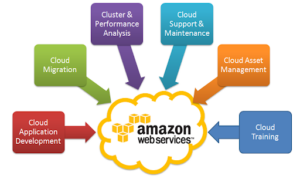Introduction
In the realm of cloud computing, Amazon Web Services (AWS) stands as a towering giant, revolutionising the way businesses and individuals leverage technology. Founded by Amazon in 2006, AWS has evolved into a comprehensive cloud platform, offering a myriad of services which cater to diverse computing needs. In this blog we’ll delve into the world of AWS, exploring its history, advantages, and a broad overview of the services it provides. Whether you’re a professional IT professional or a newbie to cloud computing, understanding what AWS is and how its services function is essential in navigating the digital landscape.
What is Amazon Web Services (AWS)?
Amazon Web Services, often known as AWS, is a comprehensive and scalable cloud computing platform offered by Amazon. It offers a diverse set of services which includes computing power, storage, databases, machine learning, analytics, and more delivered over the internet. AWS enables businesses to access and utilise computing resources without the requirement for upfront investments in physical hardware.
AWS History:
The inception of AWS dates back to 2006 when Amazon introduced its Elastic Compute Cloud (EC2) service, marking the beginning of cloud computing as a mainstream technology. Over the years, AWS has rapidly expanded its service offerings, becoming a significant player in the cloud computing industry. Today, AWS serves millions of customers globally, which ranges from startups to Fortune 500 companies.
AWS Overview:
- Compute Services:
- Amazon EC2 (Elastic Compute Cloud): Provides virtual servers in the cloud, which allows users to run applications and services without the need for physical hardware.
- AWS Lambda: Enables serverless computing by executing code in response to events without the need for server provisioning
2. Storage Services:
- Amazon S3 (Simple Storage Service): Offers scalable object storage for data storage and retrieval.
- Amazon EBS (Elastic Block Store): Provides block-level storage volumes for use with EC2 instances.
3. Database Services:
- Amazon RDS (Relational Database Service): It manages relational databases like MySQL, PostgreSQL, and SQL Server.
- Amazon DynamoDB: A fully managed NoSQL database service for high performance applications.
4. Networking Services:
- Amazon VPC (Virtual Private Cloud): It enables users to create isolated networks within the AWS cloud.
- Amazon Route 53: A scalable domain name system (DNS) web service for routing end-user requests.
5. Machine Learning Services:
- Amazon SageMaker: Simplifies the process of building, training, and deploying machine learning models.
- Amazon Comprehend: A natural language processing service for extracting insights from text.
6. Analytics Services:
- Amazon Redshift: A fully managed data warehouse for running complex queries on large datasets.
- Amazon Kinesis: Facilities real-time processing of streaming data.
7. Security and Identity Services:
- AWS IAM (Identity and Access Management): Manage access to AWS services securely.
- Amazon Cognito: A service for identity management and user authentication.

AWS Advantages:
- Scalability: AWS allows users to scale resources up or down based on demand, while ensuring optimal performance and cost efficiency.
- Flexibility: With a vast array of services, AWS caters to diverse computing needs, offering flexibility to users across various industries.
- Cost-Effective: Users only pay for the computing resources they consume, avoiding the upfront costs associated with physical infrastructure.
- Reliability:AWS’s global infrastructure provides high availability and reliability, ensuring consistent performance and uptime.
- Security:AWS employs robust security measures, including encryption, firewalls, and identity management, to safeguard data and applications.
AWS Applications:
- Web Hosting: Many websites and web applications host their infrastructure on AWS for scalability and reliability.
- Mobile App Development: AWS provides services for mobile app development, including backend infrastructure and storage.
- Data Backup and Storage: Organisations use AWS for secure and scalable data backup and storage solutions.
- Big Data Analytics: AWS offers services for processing and analysing large datasets, making it ideal for big data applications.
- Internet of Things (IoT): AWS provides a platform for managing analysing data from IoT devices.
Conclusion:
In the ever-evolving landscape of cloud computing, Amazon web Services remains at the forefront, empowering businesses with scalable and innovative solutions. This brief overview of AWS services has touched upon its history, advantages and a glimpse into the diverse offerings that cater to a wide array of computing needs. As businesses continue to embrace the cloud for agility and efficiency, AWS stands as a key enabler, which provides the foundation for digital transformation and technological advancements. Whether you’re considering a move to the cloud or seeking to deepen your understanding of AWS, the journey into the world of Amazon Web Services holds the promise of unlocking new possibilities in the digital era.





No comment yet, add your voice below!